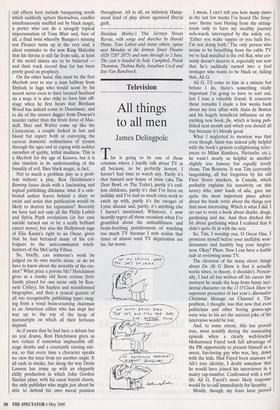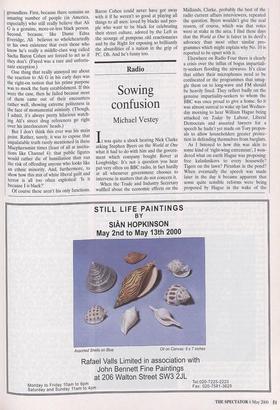Television
All things to all men
James Delingpole
This is going to be one of those columns where I hardly talk about TV at all because, to be perfectly honest, I haven't had time to watch any. Partly it's that bastard new house of mine (aka The Dust Bowl, or The Toilet), partly it's end- less childcare, partly it's that I've been on holiday and I've had so much extra work to catch up with, partly it's the ravages of Lyme disease and, partly, it's anything else I haven't mentioned. Whatever, I now heartily regret all those occasions when I've grumbled about the unhealthiness and brain-leeching pointlessness of watching too much TV because I now realise that times of almost total TV deprivation are far, far worse. I mean, I can't tell you how many times in the last few weeks I've heard The Simp- sons' theme tune blaring from the sitting- room only to have my stealthy journey sofa-wards interrupted by the wifely cry, `Either you make supper or you bath Ivo. I'm not doing both.' The only person who seems to be benefiting from the cable TV we've had installed is the evil Rat, who cer- tainly doesn't deserve it, especially not now that he's suddenly turned into a foul teenager who wants to be black or, failing that, Ali G.
Ali G. I'll come to him in a minute but before I do, there's something vitally important I'm going to have to sort out, lest I lose a valuable friend. It concerns those remarks I made a few weeks back about my love affair with Alain de Botton and his hugely beneficial influence on my exciting new book, fin, which is being pub- lished next month and which you should all buy because it's bloody good.
What I neglected to mention was that even though Alain was indeed jolly helpful with the book's genesis (enlightening refer- ences to Milan Kundera, Nietzsche etc.), he wasn't nearly as helpful as another slightly less famous but equally lovely chum, Tim Rostron. It was Tim (currently languishing, all but forgotten by his old Fleet Street muckers, in Canada, which probably explains his sensitivity on this score) who, inter loads of alia, gave me quite the most important piece advice about the book: write about the things you find most interesting. Which is what I did. I set out to write a book about sharks, drugs, gardening and me. And then ditched the bit about gardening when I realised that it didn't quite fit in with the rest.
So, Tim, I worship you, 0 Great One, I prostrate myself before your ineffable won- drousness and humbly beg your forgive- ness. Okay? Phew. Now I can have a feeble stab at reviewing some TV.
The cleverest of the many clever things about Da Ali G Show is that it actually works when, in theory, it shouldn't. Person- ally, I had all but written off his career the moment he made the leap from funny inci- dental character on the 11 O'Clock Show to superstar presenter of last year's Alternative Christmas Message on Channel 4. The problem, I thought, was that now that even politicians and other boring grown-ups were wise to his act the satirical joke of his interviews would be lost.
And, to some extent, this has proved true, most notably during the nauseating episode when a clearly well-briefed Mohammed Fayed took full advantage of the PR opportunity to present himself as a sweet, fun-loving guy who was, hey, down with the kids. Had Fayed been unaware of Ali's true identity, I doubt somehow that he would have joined his interviewer in a matey rap-number. Confronted with a real life Ali G, Fayed's more likely response would be to call immediately for Security. Mostly, though, my fears have proved groundless. First, because there remains an amazing number of people (in America, especially) who still really believe that Ali G is a genuine, more-or-less black person. Second, because, like Dame Edna Everidge, Ali believes so wholeheartedly in his own existence that even those who know he's really a middle-class wag called Sacha Baron Cohen are forced to act as if they don't. (Fayed was a rare and unfortu- nate exception.) One thing that really annoyed me about the reaction to Ali G in his early days was the right-on notion that his prime purpose was to mock the fusty establishment. If this were the case, then he failed because most of them came out of their encounters rather well, showing extreme politeness in the face of monumental asininity. (Though, I admit, it's always pretty hilarious watch- ing Ali's street drug references go right over his interlocutors' heads.) But I don't think this ever was his main point. Rather, surely, it was to expose that unpalatable truth rarely mentioned in these Macphersonist times (least of all at institu- tions like Channel 4): that public figures would rather die of humiliation than run the risk of offending anyone who looks like an ethnic minority. And, furthermore, to show how this mix of white liberal guilt and terror is all too often exploited: 'Is it because I is black?'
Of course these aren't his only functions. Baron Cohen could never have got away with it if he weren't so good at playing all things to all men: loved by blacks and peo- ple who want to be black for celebrating their street culture, adored by the Left as the scourge of pompous old reactionaries and by the Right for exposing so brilliantly the absurdities of a nation in the grip of PC. Oh. And he's funny too.



































































 Previous page
Previous page